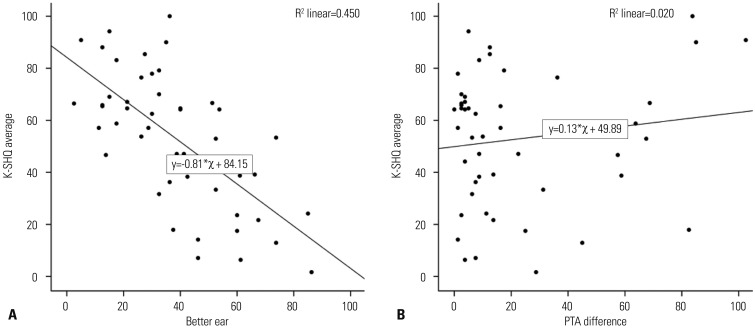Yonsei Med J.
2017 Jul;58(4):842-847. 10.3349/ymj.2017.58.4.842.
Validation of the Korean Version of the Spatial Hearing Questionnaire for Assessing the Severity and Symmetry of Hearing Impairment
- Affiliations
-
- 1Department of Otorhinolaryngology-Head and Neck Surgery, Yonsei University Wonju College of Medicine, Wonju, Korea. sangyoo3@yonsei.ac.kr
- KMID: 2419093
- DOI: http://doi.org/10.3349/ymj.2017.58.4.842
Abstract
- PURPOSE
Spatial hearing refers to the ability to understand speech and identify sounds in various environments. We assessed the validity of the Korean version of the Spatial Hearing Questionnaire (K-SHQ).
MATERIALS AND METHODS
We performed forward translation of the original English SHQ to Korean and backward translation from the Korean to English. Forty-eight patients who were able to read and understand Korean and received a score of 24 or higher on the Mini-Mental Status Examination were included in the study. Patients underwent pure tone audiometry (PTA) using a standard protocol and completed the K-SHQ. Internal consistency was evaluated using Cronbach's alpha, and factor analysis was performed to prove reliability. Construct validity was tested by comparing K-SHQ scores from patients with normal hearing to those with hearing impairment. Scores were compared between subjects with unilateral or bilateral hearing loss and between symmetrical and asymmetrical hearing impairment.
RESULTS
Cronbach's alpha showed good internal consistency (0.982). Two factors were identified by factor analysis: There was a significant difference in K-SHQ scores for patients with normal hearing compared to those with hearing impairment. Patients with asymmetric hearing impairment had higher K-SHQ scores than those with symmetric hearing impairment. This is related to a lower threshold of PTA in the better ear of subjects. The hearing ability of the better ear is correlated with K-SHQ score.
CONCLUSION
The K-SHQ is a reliable and valid tool with which to assess spatial hearing in patients who speak and read Korean. K-SHQ score reflects the severity and symmetry of hearing impairment.
MeSH Terms
Figure
Reference
-
1. Glyde H, Cameron S, Dillon H, Hickson L, Seeto M. The effects of hearing impairment and aging on spatial processing. Ear Hear. 2013; 34:15–28. PMID: 22941406.
Article2. Tyler RS, Perreau AE, Ji H. Validation of the Spatial Hearing Questionnaire. Ear Hear. 2009; 30:466–474. PMID: 19494777.
Article3. Schafer EC, Beeler S, Ramos H, Morais M, Monzingo J, Algier K. Developmental effects and spatial hearing in young children with normal-hearing sensitivity. Ear Hear. 2012; 33:e32–e43. PMID: 22688920.
Article4. Banh J, Singh G, Pichora-Fuller MK. Age affects responses on the Speech, Spatial, and Qualities of Hearing Scale (SSQ) by adults with minimal audiometric loss. J Am Acad Audiol. 2012; 23:81–91. PMID: 22353676.
Article5. Ahlstrom JB, Horwitz AR, Dubno JR. Spatial separation benefit for unaided and aided listening. Ear Hear. 2014; 35:72–85. PMID: 24121648.
Article6. Cameron S, Glyde H, Dillon H. Listening in Spatialized Noise-Sentences Test (LiSN-S): normative and retest reliability data for adolescents and adults up to 60 years of age. J Am Acad Audiol. 2011; 22:697–709. PMID: 22212768.
Article7. Lunner T. Cognitive function in relation to hearing aid use. Int J Audiol. 2003; 42(Suppl 1):S49–S58. PMID: 12918610.
Article8. Gatehouse S, Noble W. The Speech, Spatial and Qualities of Hearing Scale (SSQ). Int J Audiol. 2004; 43:85–99. PMID: 15035561.
Article9. Zhang J, Tyler R, Ji H, Dunn C, Wang N, Hansen M, et al. Speech, Spatial and Qualities of Hearing Scale (SSQ) and Spatial Hearing Questionnaire (SHQ) changes over time in adults with simultaneous cochlear implants. Am J Audiol. 2015; 24:384–397. PMID: 25934950.
Article10. Jun HJ, Yoo IW, Hwang SJ, Hwang SY. Validation of a Korean version of the Tinnitus Handicap Questionnaire. Clin Exp Otorhinolaryngol. 2015; 8:198–201. PMID: 26330911.
Article11. Moulin A, Richard C. Validation of a French-language version of the Spatial Hearing Questionnaire, cluster analysis and comparison with the speech, spatial, and qualities of hearing scale. Ear Hear. 2016; 37:412–423. PMID: 26808287.
Article12. Potvin J, Punte AK, Van de Heyning P. Validation of the Dutch version of the Spatial Hearing Questionnaire. B-ENT. 2011; 7:235–244. PMID: 22338235.13. Delphi M, Zamiri Abdolahi F, Tyler R, Bakhit M, Saki N, Nazeri AR. Validity and reliability of the Persian version of Spatial Hearing Questionnaire. Med J Islam Repub Iran. 2015; 29:231. PMID: 26793624.
- Full Text Links
- Actions
-
Cited
- CITED
-
- Close
- Share
- Similar articles
-
- Management of Hearing Aids Clinic
- Rehabilitation of Sensorineural Hearing Loss: Hearing Aid
- The Relationship between Snoring Noise and Hearing Impairment in Snorers and Their Spouses
- Early Detection of Childhood Hearing Impairment
- Comparison of a Free-Field and a Closed-Field Sound Source Identification Paradigms in Assessing Spatial Acuity in Adults With Normal Hearing Sensitivity


